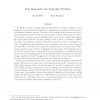Free Online Productivity Tools
i2Speak
i2Symbol
i2OCR
iTex2Img
iWeb2Print
iWeb2Shot
i2Type
iPdf2Split
iPdf2Merge
i2Bopomofo
i2Arabic
i2Style
i2Image
i2PDF
iLatex2Rtf
Sci2ools
111
click to vote
WDAG
2009
Springer
2009
Springer
New Bounds for the Controller Problem
The (M, W)-controller, originally studied by Afek, Awerbuch, Plotkin, and Saks, is a basic ted tool that provides an abstraction for managing the consumption of a global resource in a distributed dynamic network. The input to the controller arrives online in the form of requests presented at arbitrary nodes. A request presented at node u corresponds to the “desire” of some entity to consume one unit of the global resource at u and the controller should handle this request within finite time by either granting it with a permit or denying it. Initially, M permits (corresponding to M units of the global resource) are stored at a designated root node. Throughout the execution permits can be transported from place to place along the network’s links so that they can be granted to requests presented at various nodes; when a permit is granted to some request, it is eliminated from the network. The fundamental rule of an (M, W)-controller is that a request should not be denied unless it...
Related Content
| Added | 25 May 2010 |
| Updated | 25 May 2010 |
| Type | Conference |
| Year | 2009 |
| Where | WDAG |
| Authors | Yuval Emek, Amos Korman |
Comments (0)

